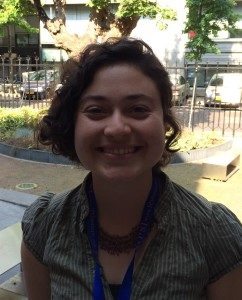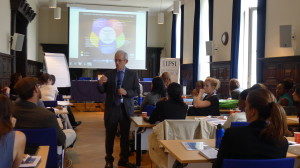Juliana Gonzalez, Colombia
The Hague Symposium has officially begun and we all eagerly sit at Clingendael, waiting for Dr. Daniel Serwer to come in and begin the first session. We discovered that we share no unique point of departure for the reflections to come, theoretical or practical. This is precisely what Dr. Serwer intended to make us realize in the first place. “Those of you who expect me to lecture for six hours will be disappointed,” he warned us. Instead, we faced the challenge of brainstorming by ourselves answers to the Syrian question: what goals should be formulated leading to the post-conflict processes hopefully to take place there soon? We were enthusiastic to bring our knowledge to the table and to raise the issues of our home countries, which perhaps illuminate our intuitions about what a peaceful society should look like. We soon acknowledged how these intuitions either bring us together or draw us apart. The conditions were set for us to begin negotiating the meaning and reach of what we deem most valuable or indubitable for helping a society in transition, precisely in the light of the opinion others might hold It is certainly not a useless skill for our peacemaking aspirations.
and begin the first session. We discovered that we share no unique point of departure for the reflections to come, theoretical or practical. This is precisely what Dr. Serwer intended to make us realize in the first place. “Those of you who expect me to lecture for six hours will be disappointed,” he warned us. Instead, we faced the challenge of brainstorming by ourselves answers to the Syrian question: what goals should be formulated leading to the post-conflict processes hopefully to take place there soon? We were enthusiastic to bring our knowledge to the table and to raise the issues of our home countries, which perhaps illuminate our intuitions about what a peaceful society should look like. We soon acknowledged how these intuitions either bring us together or draw us apart. The conditions were set for us to begin negotiating the meaning and reach of what we deem most valuable or indubitable for helping a society in transition, precisely in the light of the opinion others might hold It is certainly not a useless skill for our peacemaking aspirations.
 Several concepts and questions regarding the framework for holistic transitions were approached through Dr. Serwer’s dialogical teaching methodology. We explored the concepts pertaining to the fields of governance, security, human needs and development, and national unity or identity. Dr. Serwer shared his insights on these matters; he repeatedly advised that we pay attention to the context and intention of peace negotiations and become sensitive to the broader network of considerations that surround international justice. He revealed how his views are informed by his extensive experience working in the field. However, we could also question the context itself in which Dr. Serwer believes transition processes take place. For instance, is the modern capitalist economy one we should so readily accept? Should national identity and the apparently all-encompassing “we, the people” ideals doubtlessly guide our efforts at achieving peace? Should state legitimacy only be understood as consent, rather than in relation to some form of popular control over legislation and political exercise?
Several concepts and questions regarding the framework for holistic transitions were approached through Dr. Serwer’s dialogical teaching methodology. We explored the concepts pertaining to the fields of governance, security, human needs and development, and national unity or identity. Dr. Serwer shared his insights on these matters; he repeatedly advised that we pay attention to the context and intention of peace negotiations and become sensitive to the broader network of considerations that surround international justice. He revealed how his views are informed by his extensive experience working in the field. However, we could also question the context itself in which Dr. Serwer believes transition processes take place. For instance, is the modern capitalist economy one we should so readily accept? Should national identity and the apparently all-encompassing “we, the people” ideals doubtlessly guide our efforts at achieving peace? Should state legitimacy only be understood as consent, rather than in relation to some form of popular control over legislation and political exercise?
Our first day of the Symposium concluded with our representation of the different actors involved in the Syrian conflict, both on the side of the regime and the opposition. In order to perform our roles adequately we were required to imagine the interests of our contenders as well. This way, we were made to test the reach of our convictions and concessions in order to qualify our positions. In the course of this process it seemed difficult not to notice the fragility of human action at every step, while simultaneously –and perhaps also paradoxically– attempting to resist pouring our own values and ideals into the characters we aim to embody. Rajin, a participant in the 2014 Symposium, shared insights based on her own personal experience that tuned our intuitions with reality: in the face of violence or oppression, no one’s position is as distinct and predictable as we usually believe it to be. Fear can make individuals forget even their most treasured attachment to others. Also, there are always individuals who end up being silenced whenever we intend to represent the “relevant” actors in a conflict for the purpose of a peace agreement. In sum, as Dr. Serwer hinted to as well, negotiation occurs at a much deeper level in society than merely deciding if al-Assad or any other dictator ought to leave office.

